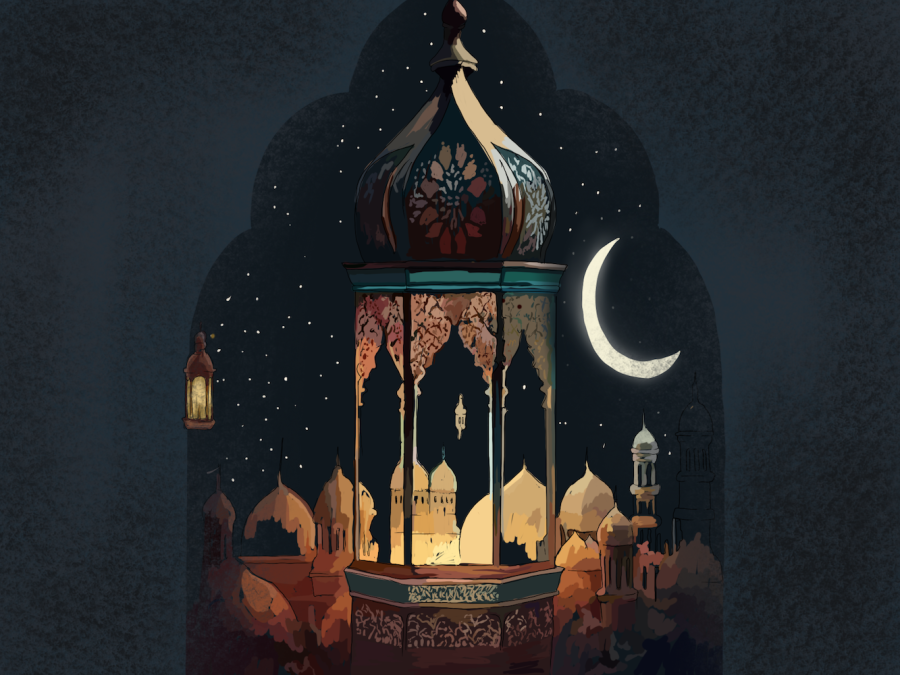Celebrating Ramadan and the Muslim experience at NYU
Ramadan, the month of fasting for Muslims, is upon us. With celebration and faith come questions and concerns for Muslims here at NYU and in the city.
(illustration by Aaliya Luthra)
March 22, 2023
The month of Ramadan begins on the evening of March 22. For one month, from sunrise to sunset leading up to Eid, the practice of fasting and the celebration of breaking fast is observed by praying and visiting friends and family.
For most first-year Muslims at NYU, including myself, this is the first time we’re spending Eid away from home. That adjustment raises many questions for students, such as how we will celebrate Ramadan and practice fasting while still attending class. Living away from home and transitioning to living in the city is already a big adjustment, but being separated during Ramadan makes home feel even further away.
Despite many students being away from home, there is still a Muslim community at NYU. There are several clubs specifically for Muslims, including the Muslims Student Association, The Black Muslim Initiative at NYU and Mu Delta Alpha, a Muslim sorority. When Ramadan begins, many of these organizations hold iftars — dinners where you break your fast — prayers and events surrounding the preparation for Eid. Not only are these clubs great ways to meet friends who share your faith, they also allow for Muslims to practice Islam and feel included.
“It’s my first time spending [Ramadan] away from my family and home,” said CAS first-year Nouran Carcora. “I always had the time to break my fast with my family at the same time, but now with the schedule and classes I have, I will probably have to adjust my schedule a little bit.”
Carcona isn’t alone. Many Muslims at NYU are struggling with similar changes in how they observe the holiday. Fasting and breaking fast with family are among the most important aspects of Ramadan, creating a sort of communal feeling. With NYU students losing this piece of the tradition, some question whether the month will still feel like a religious holiday.
“Living in the city hasn’t affected my faith, I still have the same beliefs I had and I still hold on to them no matter where I go,” Carcora said. “It’s just with the busy schedule I have, it’s hard to do my prayers on time. I practice Islam by praying, reading the Quran and avoiding what is prohibited in Islam.”
Reading the whole Quran is another Ramadan tradition in which Carcora and other Muslims partake. Many Muslims students have brought their Quran with them to their dorms, while others borrow a copy from Bobst. For some students, studying away from home has strengthened their faith as they figure out religion’s role in their lives and developing values.
But not all Muslim students feel the same strengthened faith, including CAS first-year Alia Arafeh.
“Living in the city has definitely made me feel more disconnected from my faith,” said Arafeh, who is originally from California. “My parents would remind me to pray and I would go to the mosque during holidays to pray or just to do volunteer work with my mom. I feel distanced from all of that. I know some other people have actually strengthened their faith and found community at the NYU MSA, but I’ve had a lot of apprehension about going there.”
Many Muslim students agree with Arafeh on the fact that even though there’s a Muslim community at NYU, being away from family still leads to a degree of disconnection. Despite this, students reminisce about the family celebrations they hold dear. For instance, Arafeh’s family likes to make a paper chain to mark the different days.
“With different colors representing the halfway mark and 10-day mark, I rip a little chain off each night,” Arafeh said. “We usually decorate the house with lights and pray taraweeh as a family each night as well, and wake up for suhoor as a family.”
Muslim students often decorate their rooms and shared spaces in preparation for Ramadan and Eid. Muslim students can also feel more at home by visiting ethnic stores and restaurants in the city. Despite the issue of cost, food plays an important role in bringing communities together.
“We eat mostly Lebanese/Syrian dishes and a lot of desserts, which is something I’m going to miss a lot being in college,” Arafeh said.
There is seemingly no single path to feeling completely connected to your faith while living away during college, because it won’t be the same as coming together with your family. Nonetheless, students can still recognize the importance and value of clubs that celebrate faith and togetherness. These NYU clubs bring Muslims together, providing a community that helps soothe the homesickness that missing family during Ramadan and Eid brings.
Contact Pritheva Zakaria at [email protected].
























































































































































